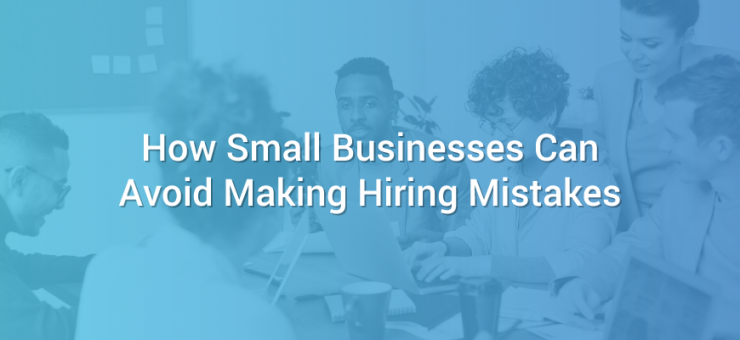Recruiting new employees as your business grows is exciting, but also risky.
Bringing the wrong people on board can be costly. Once a new employee has joined your business, it can be difficult to part ways unless there is a legitimate reason for terminating their employment, such as issues with performance or productivity, unprofessionalism, or gross misconduct. Even then, there is still the risk of an employee filing a wrongful termination lawsuit if they deem the reason they were let go to be unfair.
Although it may be apparent that the hire was a mistake, the process of letting someone go can be drawn out, often with time and resources being invested in coaching or disciplinary action.
By implementing structure around the recruitment process, many potential pitfalls can be eliminated altogether. Here are some of the most common hiring mistakes, and how to avoid them.
Not knowing what you want
The first mistake businesses make is not providing a detailed job description. As a result, you get bombarded with irrelevant resumes, which is a waste of everybody’s time. How do you expect to find the right person if you’re unsure of what you want from a prospective employee?
Vague job descriptions don’t do anybody any favors. Be as detailed as possible when explaining what the job entails, what qualifications and experience are required, the sort of personality that will be suited to the post, and define who that person will report to. To attract high-quality applicants, don’t forget to mention the perks are of joining your company.
Rush job
When a business scales quickly, there’s a lot of pressure to fill vacant positions fast.
Finding the right person takes time and resources. But making a hiring decision without thoroughly assessing the suitability of a candidate for a role can be a huge mistake. Employing someone on the basis that they will grow into the role, rather than someone who can hit the ground running will require more resources, as time needs to be dedicated to managing a less experienced member of the team.
Interviewing multiple applicants is always advised, instead of settling for the first person who walks through the door.
Asking the wrong questions
When it comes to interviewing, it’s important to be prepared. While there are plenty of good sample interview question templates out there to cover the basics, they may not be suitable for identifying each candidate’s strengths and weaknesses in areas that really matter.
After reviewing a candidate’s resume, consider what questions you should be asking to allow them to demonstrate their knowledge in the core functions of the job they are applying for. This might involve getting them to complete a job audition for example, if writing up reports will be a major part of their day-to-day tasks, a typing proficiency test may be appropriate to check for speed and accuracy.
Finding someone who is a good fit with other employees and with your company culture is crucial, too. But there are a number of questions you can’t legally ask candidates: anything about where a candidate is from, their age, gender or sex, marital or family status, religion, or health issues and disabilities are off-limits. Breaking these rules can result in a discrimination lawsuit, so make sure you steer clear.
An applicant may look perfect on paper, but then when it comes to the interview, it becomes apparent they’re not right for the business. The chances of the ‘perfect’ candidate walking through the door are unlikely. Having unrealistic expectations could mean good candidates are ignored because they don’t tick every single box. Sometimes it pays to be a little flexible. So it’s good to have an idea of what constitutes a ‘must-have’ for the role, and what aspects could be considered non-essential, but ‘nice-to-have’.
Falling at the last hurdle
Even once you’re confident you’ve found the right person, before making an offer, ensure they are properly vetted.
Pre-employment screening can verify qualifications and performance in past employment. In certain roles, checking if a candidate has a criminal record, points on their driving license, or is clean from drugs and alcohol, could also be considered part of the vetting process.
If there are unanswered questions from the interview process, or if further proof is needed of a candidate’s competency, follow up by checking references. To get the most from talking to references, prepare questions to address specific concerns, or that validate an applicant’s skills or experience.
Think about how many additional risks your business opens itself up to by skipping this step. Hiring an accountant who cooked the books in a previous role, a delivery driver with multiple DUIs, or a clerk with a history of harassing female employees could destroy your company’s reputation and bank balance overnight.
About the Author
 Maureen Brogie is a Senior Advisor at InsuranceBee, a provider of small business liability insurance. Maureen holds a BS in Finance and is a licensed Property & Casualty agent in 40 states. Following a career break to raise her twin daughters, Maureen joined InsuranceBee in 2011 and now heads up a busy team of Client Advisors.
Maureen Brogie is a Senior Advisor at InsuranceBee, a provider of small business liability insurance. Maureen holds a BS in Finance and is a licensed Property & Casualty agent in 40 states. Following a career break to raise her twin daughters, Maureen joined InsuranceBee in 2011 and now heads up a busy team of Client Advisors.











